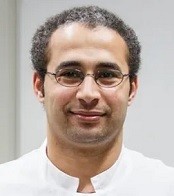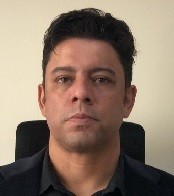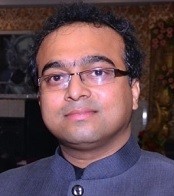 El-Sayed M. Abdelwhab is the head of the laboratory for avian influenza virus in the Institute of molecular virology and cell biology, Friedrich-Loeffler-Institut, Insel Riems, Germany. In his laboratory, he is leading a research team to study the molecular biology of influenza viruses. His main interests are the mechanism for the evolution of high pathogenic avian influenza viruses from low pathogenic precursors, interspecies transmission, vaccine efficacy and molecular epidemiology. Dr. Abdelwhab has been an Editorial Board Member for Scientific Reports since 2019.
El-Sayed M. Abdelwhab is the head of the laboratory for avian influenza virus in the Institute of molecular virology and cell biology, Friedrich-Loeffler-Institut, Insel Riems, Germany. In his laboratory, he is leading a research team to study the molecular biology of influenza viruses. His main interests are the mechanism for the evolution of high pathogenic avian influenza viruses from low pathogenic precursors, interspecies transmission, vaccine efficacy and molecular epidemiology. Dr. Abdelwhab has been an Editorial Board Member for Scientific Reports since 2019.
 Ivan Campeotto is a Senior Lecturer at Nottingham Trent University, UK. He is a protein crystallographer interested in host-protein interaction in several human pathogens. His group focuses on structure-guided development of vaccines prototypes against new emerging and neglected diseases using a combination of computational biology and structural biology techniques. Dr Campeotto has been an Editorial Board Member for Scientific Reports since 2019.
Ivan Campeotto is a Senior Lecturer at Nottingham Trent University, UK. He is a protein crystallographer interested in host-protein interaction in several human pathogens. His group focuses on structure-guided development of vaccines prototypes against new emerging and neglected diseases using a combination of computational biology and structural biology techniques. Dr Campeotto has been an Editorial Board Member for Scientific Reports since 2019.
 Sérgio Oliveira de Paula is a Professor and Researcher at the Department of General Biology at the Federal University of Viçosa, Brazil, where he conducts research on arboviruses, which are viruses transmitted by mosquitoes, such as Dengue, Mayaro, Zika, Yellow fever and currently with SARS-COV-2. In the laboratory coordinated by the Professor, the Molecular Immunovirology Laboratory, research is carried out with serological and molecular diagnosis of dengue and Zika, vaccines against Covid-19 and dengue, and animal models of diseases such as arthralgia caused by the Mayaro virus. Prof de Paula has been an Editorial Board Member for Scientific Reports since 2019.
Sérgio Oliveira de Paula is a Professor and Researcher at the Department of General Biology at the Federal University of Viçosa, Brazil, where he conducts research on arboviruses, which are viruses transmitted by mosquitoes, such as Dengue, Mayaro, Zika, Yellow fever and currently with SARS-COV-2. In the laboratory coordinated by the Professor, the Molecular Immunovirology Laboratory, research is carried out with serological and molecular diagnosis of dengue and Zika, vaccines against Covid-19 and dengue, and animal models of diseases such as arthralgia caused by the Mayaro virus. Prof de Paula has been an Editorial Board Member for Scientific Reports since 2019.
 Joakim Dillner, MD, PhD, Professor of Infectious Disease Epidemiology at Karolinska Institutet since 2009, Head of Unit at the Karolinska University Hospital, Center for Cervical Cancer Prevention since 2014 and Scientific Director of the Karolinska University Laboratory (now Medical Diagnostics Karolinska), Karolinska University Hospital since 2017. His group conducts Human Papillomavirus (HPV) research in the areas of molecular biology, immunology and vaccinology, clinical virology and epidemiology. He is involved with major projects around HPV vaccination and screening, cervical cancer prevention, e-health and AI-driven exposome assessment tools. During the recent pandemic, he has worked on mapping the spread of SARS-CoV-2 among healthcare professionals, and how vaccination against the virus protects against infection and the spread of infection. Prof Dillner has been an Editorial Board Member for Scientific Reports since 2015.
Joakim Dillner, MD, PhD, Professor of Infectious Disease Epidemiology at Karolinska Institutet since 2009, Head of Unit at the Karolinska University Hospital, Center for Cervical Cancer Prevention since 2014 and Scientific Director of the Karolinska University Laboratory (now Medical Diagnostics Karolinska), Karolinska University Hospital since 2017. His group conducts Human Papillomavirus (HPV) research in the areas of molecular biology, immunology and vaccinology, clinical virology and epidemiology. He is involved with major projects around HPV vaccination and screening, cervical cancer prevention, e-health and AI-driven exposome assessment tools. During the recent pandemic, he has worked on mapping the spread of SARS-CoV-2 among healthcare professionals, and how vaccination against the virus protects against infection and the spread of infection. Prof Dillner has been an Editorial Board Member for Scientific Reports since 2015.
 Niels A. Lemmermann is research group leader at the Institute for Virology, University Medical Center Mainz, Germany. He is an expert in viral immunity and virus-host-interactions. He is interested in the immune control of cytomegaloviruses during acute infection and latency. Further, his lab is working on preclinical models for enhancing the efficiency of virus-specific cell therapies. Dr Lemmermann has been an Editorial Board Member for Scientific Reports since 2019.
Niels A. Lemmermann is research group leader at the Institute for Virology, University Medical Center Mainz, Germany. He is an expert in viral immunity and virus-host-interactions. He is interested in the immune control of cytomegaloviruses during acute infection and latency. Further, his lab is working on preclinical models for enhancing the efficiency of virus-specific cell therapies. Dr Lemmermann has been an Editorial Board Member for Scientific Reports since 2019.
 Timir Tripathi is a Senior Assistant Professor and Principal Investigator at the Department of Biochemistry, North-Eastern Hill University, Shillong, India. His primary research focus is on protein-substrate interaction and dynamics and understanding the roles of non-catalytic domains in regulating the catalytic activity of proteins. In addition, he is interested in studying the conformational polymorphism, dynamics, and stabilization of the fuzzy complexes formed by neuropathological protein aggregates. Dr Tripathi has been an Editorial Board Member for Scientific Reports since 2017.
Timir Tripathi is a Senior Assistant Professor and Principal Investigator at the Department of Biochemistry, North-Eastern Hill University, Shillong, India. His primary research focus is on protein-substrate interaction and dynamics and understanding the roles of non-catalytic domains in regulating the catalytic activity of proteins. In addition, he is interested in studying the conformational polymorphism, dynamics, and stabilization of the fuzzy complexes formed by neuropathological protein aggregates. Dr Tripathi has been an Editorial Board Member for Scientific Reports since 2017.

